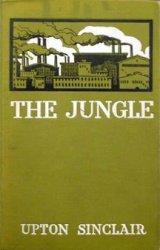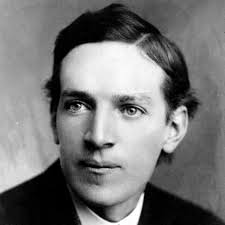The Jungle Page #31
The Jungle is a 1906 novel by the American journalist and novelist Upton Sinclair. Sinclair wrote the novel to portray the harsh conditions and exploited lives of immigrants in the United States in Chicago and similar industrialized cities.
But only ten days after she had joined, Marija's canning factory closed down, and that blow quite staggered them. They could not understand why the union had not prevented it, and the very first time she attended a meeting Marija got up and made a speech about it. It was a business meeting, and was transacted in English, but that made no difference to Marija; she said what was in her, and all the pounding of the chairman's gavel and all the uproar and confusion in the room could not prevail. Quite apart from her own troubles she was boiling over with a general sense of the injustice of it, and she told what she thought of the packers, and what she thought of a world where such things were allowed to happen; and then, while the echoes of the hall rang with the shock of her terrible voice, she sat down again and fanned herself, and the meeting gathered itself together and proceeded to discuss the election of a recording secretary. Jurgis too had an adventure the first time he attended a union meeting, but it was not of his own seeking. Jurgis had gone with the desire to get into an inconspicuous corner and see what was done; but this attitude of silent and open-eyed attention had marked him out for a victim. Tommy Finnegan was a little Irishman, with big staring eyes and a wild aspect, a “hoister” by trade, and badly cracked. Somewhere back in the far-distant past Tommy Finnegan had had a strange experience, and the burden of it rested upon him. All the balance of his life he had done nothing but try to make it understood. When he talked he caught his victim by the buttonhole, and his face kept coming closer and closer--which was trying, because his teeth were so bad. Jurgis did not mind that, only he was frightened. The method of operation of the higher intelligences was Tom Finnegan's theme, and he desired to find out if Jurgis had ever considered that the representation of things in their present similarity might be altogether unintelligible upon a more elevated plane. There were assuredly wonderful mysteries about the developing of these things; and then, becoming confidential, Mr. Finnegan proceeded to tell of some discoveries of his own. “If ye have iver had onything to do wid shperrits,” said he, and looked inquiringly at Jurgis, who kept shaking his head. “Niver mind, niver mind,” continued the other, “but their influences may be operatin' upon ye; it's shure as I'm tellin' ye, it's them that has the reference to the immejit surroundin's that has the most of power. It was vouchsafed to me in me youthful days to be acquainted with shperrits” and so Tommy Finnegan went on, expounding a system of philosophy, while the perspiration came out on Jurgis' forehead, so great was his agitation and embarrassment. In the end one of the men, seeing his plight, came over and rescued him; but it was some time before he was able to find any one to explain things to him, and meanwhile his fear lest the strange little Irishman should get him cornered again was enough to keep him dodging about the room the whole evening. He never missed a meeting, however. He had picked up a few words of English by this time, and friends would help him to understand. They were often very turbulent meetings, with half a dozen men declaiming at once, in as many dialects of English; but the speakers were all desperately in earnest, and Jurgis was in earnest too, for he understood that a fight was on, and that it was his fight. Since the time of his disillusionment, Jurgis had sworn to trust no man, except in his own family; but here he discovered that he had brothers in affliction, and allies. Their one chance for life was in union, and so the struggle became a kind of crusade. Jurgis had always been a member of the church, because it was the right thing to be, but the church had never touched him, he left all that for the women. Here, however, was a new religion--one that did touch him, that took hold of every fiber of him; and with all the zeal and fury of a convert he went out as a missionary. There were many nonunion men among the Lithuanians, and with these he would labor and wrestle in prayer, trying to show them the right. Sometimes they would be obstinate and refuse to see it, and Jurgis, alas, was not always patient! He forgot how he himself had been blind, a short time ago--after the fashion of all crusaders since the original ones, who set out to spread the gospel of Brotherhood by force of arms. Chapter 9 One of the first consequences of the discovery of the union was that Jurgis became desirous of learning English. He wanted to know what was going on at the meetings, and to be able to take part in them, and so he began to look about him, and to try to pick up words. The children, who were at school, and learning fast, would teach him a few; and a friend loaned him a little book that had some in it, and Ona would read them to him. Then Jurgis became sorry that he could not read himself; and later on in the winter, when some one told him that there was a night school that was free, he went and enrolled. After that, every evening that he got home from the yards in time, he would go to the school; he would go even if he were in time for only half an hour. They were teaching him both to read and to speak English--and they would have taught him other things, if only he had had a little time. Also the union made another great difference with him--it made him begin to pay attention to the country. It was the beginning of democracy with him. It was a little state, the union, a miniature republic; its affairs were every man's affairs, and every man had a real say about them. In other words, in the union Jurgis learned to talk politics. In the place where he had come from there had not been any politics--in Russia one thought of the government as an affliction like the lightning and the hail. “Duck, little brother, duck,” the wise old peasants would whisper; “everything passes away.” And when Jurgis had first come to America he had supposed that it was the same. He had heard people say that it was a free country--but what did that mean? He found that here, precisely as in Russia, there were rich men who owned everything; and if one could not find any work, was not the hunger he began to feel the same sort of hunger? When Jurgis had been working about three weeks at Brown's, there had come to him one noontime a man who was employed as a night watchman, and who asked him if he would not like to take out naturalization papers and become a citizen. Jurgis did not know what that meant, but the man explained the advantages. In the first place, it would not cost him anything, and it would get him half a day off, with his pay just the same; and then when election time came he would be able to vote--and there was something in that. Jurgis was naturally glad to accept, and so the night watchman said a few words to the boss, and he was excused for the rest of the day. When, later on, he wanted a holiday to get married he could not get it; and as for a holiday with pay just the same--what power had wrought that miracle heaven only knew! However, he went with the man, who picked up several other newly landed immigrants, Poles, Lithuanians, and Slovaks, and took them all outside, where stood a great four-horse tallyho coach, with fifteen or twenty men already in it. It was a fine chance to see the sights of the city, and the party had a merry time, with plenty of beer handed up from inside. So they drove downtown and stopped before an imposing granite building, in which they interviewed an official, who had the papers all ready, with only the names to be filled in. So each man in turn took an oath of which he did not understand a word, and then was presented with a handsome ornamented document with a big red seal and the shield of the United States upon it, and was told that he had become a citizen of the Republic and the equal of the President himself.
Translation
Translate and read this book in other languages:
Select another language:
- - Select -
- 简体中文 (Chinese - Simplified)
- 繁體中文 (Chinese - Traditional)
- Español (Spanish)
- Esperanto (Esperanto)
- 日本語 (Japanese)
- Português (Portuguese)
- Deutsch (German)
- العربية (Arabic)
- Français (French)
- Русский (Russian)
- ಕನ್ನಡ (Kannada)
- 한국어 (Korean)
- עברית (Hebrew)
- Gaeilge (Irish)
- Українська (Ukrainian)
- اردو (Urdu)
- Magyar (Hungarian)
- मानक हिन्दी (Hindi)
- Indonesia (Indonesian)
- Italiano (Italian)
- தமிழ் (Tamil)
- Türkçe (Turkish)
- తెలుగు (Telugu)
- ภาษาไทย (Thai)
- Tiếng Việt (Vietnamese)
- Čeština (Czech)
- Polski (Polish)
- Bahasa Indonesia (Indonesian)
- Românește (Romanian)
- Nederlands (Dutch)
- Ελληνικά (Greek)
- Latinum (Latin)
- Svenska (Swedish)
- Dansk (Danish)
- Suomi (Finnish)
- فارسی (Persian)
- ייִדיש (Yiddish)
- հայերեն (Armenian)
- Norsk (Norwegian)
- English (English)
Citation
Use the citation below to add this book to your bibliography:
Style:MLAChicagoAPA
"The Jungle Books." Literature.com. STANDS4 LLC, 2025. Web. 9 Mar. 2025. <https://www.literature.com/book/the_jungle_272>.








Discuss this The Jungle book with the community:
Report Comment
We're doing our best to make sure our content is useful, accurate and safe.
If by any chance you spot an inappropriate comment while navigating through our website please use this form to let us know, and we'll take care of it shortly.
Attachment
You need to be logged in to favorite.
Log In